What is physiology, and how is it different to similar sciences like medicine or anatomy? Physiologist Matt Mason gives us the details...
In this episode

- Naked Body: What is Physiology?
Naked Body: What is Physiology?
Matthew Mason, University of Cambridge
What is physiology, and how is it different to similar sciences like medicine or anatomy? Physiologist Matt Mason gives us the details...
Physiology often gets confused with other sciences. It sounds a bit like physics, or psychology, or even physiotherapy. Many people know that it has something to do with the body, but how then is it different from anatomy?
While anatomists look at the structure of the body, physiologists look at the function. Physiologists are interested in understanding how bits of us work – how our heart works, kidneys, liver, spleen, pituitary gland, lymphatic system, epididymis - every squishy little bit of us you might never even have heard of! One of the most important branches of physiology is neuroscience, which looks at how your brain, nerves and sense organs work.
You might have an image now of a scientist in a lab coat prodding something sticky on a dish, but physiologists don’t just look at individual organs in isolation. One of themost fascinating things about the body is how all the different parts work together, to overcome challenges. For example, if you decide to go for a 10k run, your muscles obviously need to do a lot of work. That means that they need more oxygen, so you need to breathe harder. You need to circulate blood around the body more rapidly, and release extra glucose from your liver to provide energy. You will be getting hot, so you might need to start sweating. But as you sweat you will begin to dehydrate, so your kidneys need to save more of your precious water, by concentrating the urine. Lots of organs are working together to allow you to complete your run, and they all need to be controlled, perhaps using nerves or hormones, in most cases without you even noticing!
Sports physiologists are particularly interested in that particular challenge, and how we can improve our performance in running races and other athletic events. Comparative physiologists might be interested in how desert animals cope with the heat, particularly important in the light of climate change, while plant physiologists are looking at how they can improve crop yields to feed an ever-expanding world population.
If physiologists want to understand properly how the body works they have to know a little bit about anatomy, because how the organs are put together helps to determine their function. They have to know a bit of physics, if they are going to understand how blood flows in blood vessels or how nerves conduct electrical signals. They have to know some chemistry, if they want to understand how enzymes work or how energy is used in the cell. The great joy of physiology is that it brings together all these other sciences and applies them to the big questions about how we do...everything we do!










Comments
Amen
Amen
Add a comment